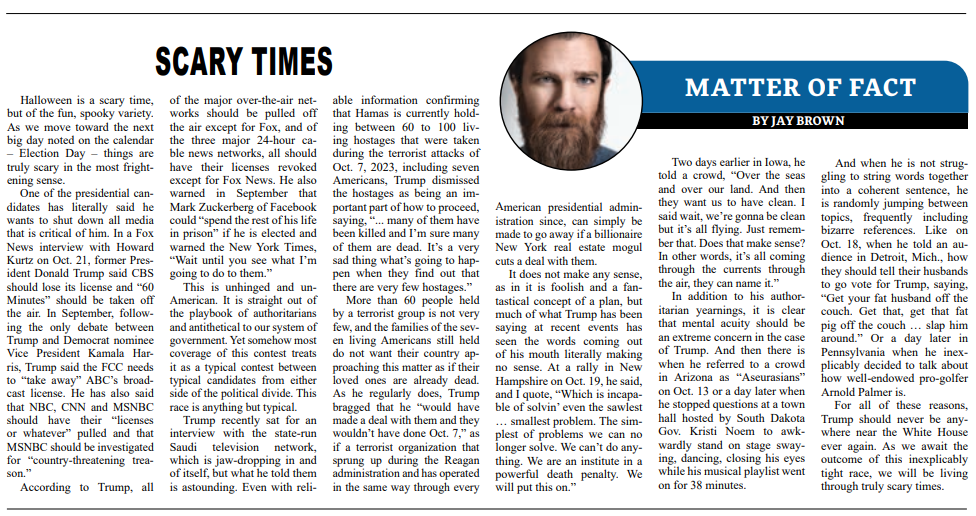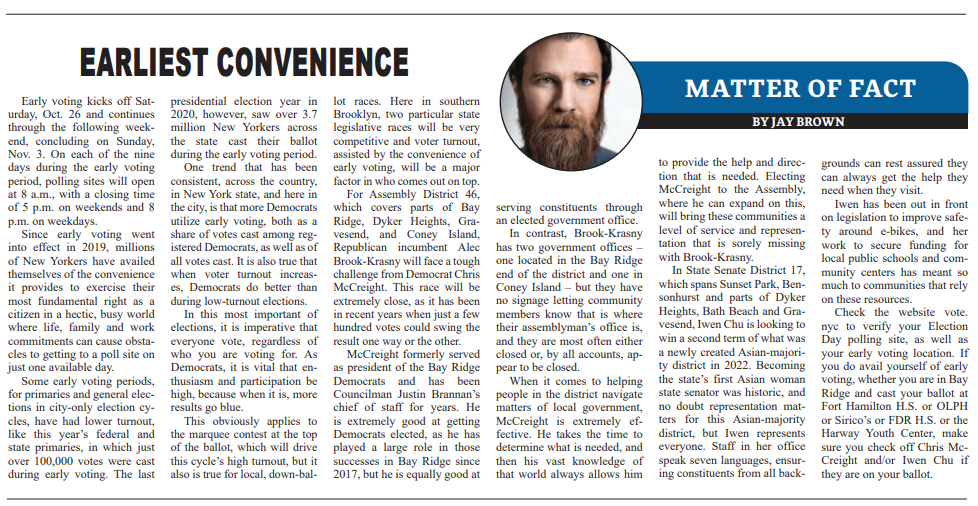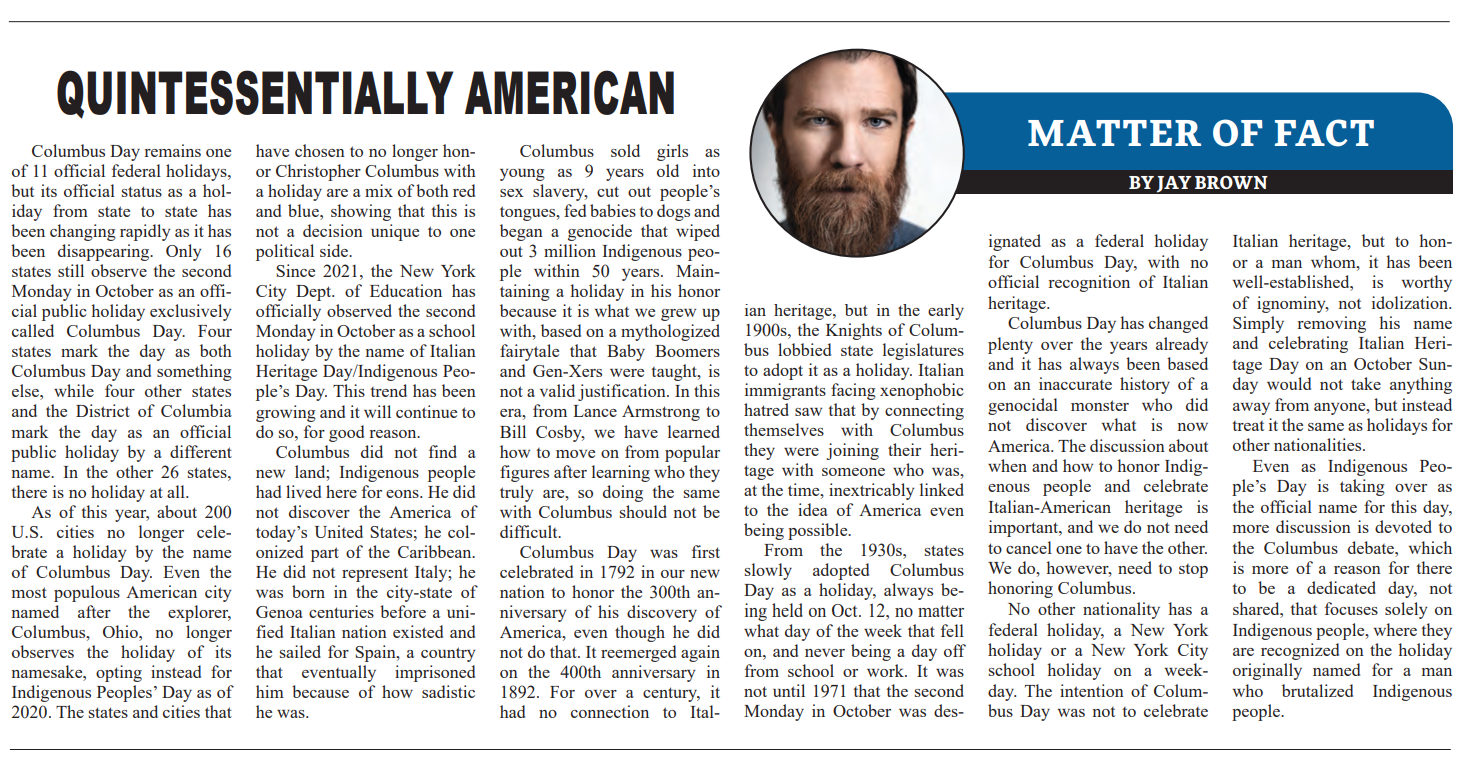This column, from the weekly opinion piece MATTER OF FACT, first appeared on BrooklynReporter.com, the Home Reporter and Spectator dated September 25, 2020
Ruth Bader Ginsburg lived a life of firsts. She graduated first in her classes at both Cornell University in 1954 and at Columbia Law School in 1959. She was the first female member of the Harvard Law Review and, after joining the Columbia Law Review, she became the first woman to serve on two major law reviews.
She would later go on to be the first female tenured professor at Columbia. On Friday, September 25, she was the first woman to lie in state in the United States Capitol.

Ginsburg was born in Brooklyn in 1933 in the hospital now known as Maimonides Medical Center and she grew up in Flatbush.
While working for the Social Security Administration, she was demoted after becoming pregnant with her first child. She transferred to Columbia Law School after her dean at Harvard asked why she was there, taking the place of a man.

Her legal career had a monumental impact on the lives of women in this country. From being able to have a credit card, a leased apartment or a purchased property in your own name to the ability to play a sport in school or consent to your own medical treatment, every woman can thank RBG for that.
What is nearly as sad as her passing is the fact that the Supreme Court vacancy it creates is being used by the president and senate republicans to do what they said could not be done four years ago under a democratic president.

Mitch McConnell barely waited an hour after news of Ginsburg’s death broke to announce that he would rush to fill her seat before an election that was a mere month-and-a-half away, after he refused to do anything when a seat opened eleven months ahead of election day in 2016.
The rank hypocrisy is astounding. McConnell declared in 2016 that “the nomination should be made by the president the people elect in the election that’s underway right now.” Four years ago, he stated that “The American people should have a voice in the selection of their next Supreme Court Justice.”
Senators McConnell, Graham, Gardner, Cruz, Tillis, Grassley, Cornyn, Perdue, Lee ALL went on record to NOT appoint a Supreme Court Justice in 2016, a Presidential election year.
— Peter Morley (@morethanmySLE) September 20, 2020
Senator Graham asked us to use his words against him in the future. We WILL!pic.twitter.com/PU0eEuhmp7
Then-Chairman of the Senate Judiciary Committee, Chuck Grassley, said in 2016 that President Obama’s nominee should not be considered during an election year and reaffirmed in 2018 that if the same situation arose in 2020, “I would not have a hearing on it because that’s what I promised the people in 2016.” Now, he has gone back on that promise to the people.
Current Chairman of the Senate Judiciary Committee, Lyndsey Graham, said in 2016, “I want you to use my words against me. If there’s a Republican president in 2016 and a vacancy occurs in the last year of the first term, you can say Lindsey Graham said let’s let the next president, whoever it might be, make that nomination.” In 2018, he reasserted that “if an opening comes in the last year of President Trump’s term, and the primary process has started, we’ll wait to the next election.” Now, he has gone back on his words.
“I want you to use my words against me. If there’s a Republican president in 2016 and a vacancy occurs in the last year of the first term, you can say Lindsey Graham said let’s let the next president, whoever it might be, make that nomination." pic.twitter.com/quD1K5j9pz
— Vanita Gupta (@vanitaguptaCR) September 19, 2020
This is the antithesis of democracy. It is about sheer power; one party doing whatever it takes to cement minority rule.
A president elected by a minority of Americans, who was acquitted in his impeachment trial by senators representing a minority of the population, may soon have appointed a third of the judges serving on the Supreme Court. If his nominee is confirmed, it will mean that a majority of the justices on the court will have been appointed by two men, George W. Bush and Donald Trump, who became president with a minority of the vote.
“What is nearly as sad as her passing is the fact that the Supreme Court vacancy it creates is being used by the president and senate republicans to do what they said could not be done four years ago under a democratic president.”
Senate Republicans will make excuses as to why they are breaking the precedent they set four years ago and how this situation is technically different, but the fact is, they would have hypocritically changed their stance even if the circumstances were exactly the same.
In 1864, a Supreme Court seat opened up just weeks before Election Day. Even though his party controlled the senate, President Lincoln waited until after he had won reelection to make a nomination. The man named Lincoln would be ashamed of the party of Lincoln.




